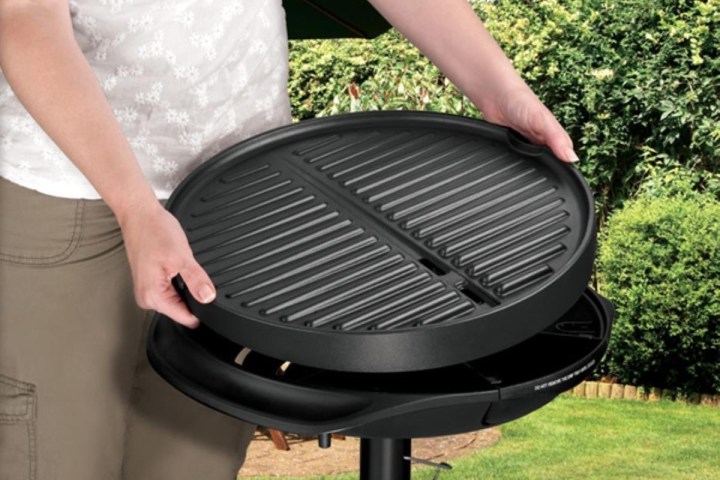Firing up the grill for a summer cookout is a tradition for the ages, but not everyone has a sizeable backyard or patio to cook on. For city-dwellers and those without backyards, grilling on an apartment balcony may be the next best thing. But whether or not you can grill on your apartment’s balcony has a lot to do with where you live, from the state to the city to your building. Let’s take a look at some of the logistics to help you determine whether or not it’s safe to light up the propane next summer.
Rules
Home grills cause an average of 10,600 fires a year, according to the National Fire Protection Association, though not just in apartments. Yet 29 percent of these fires started on an exterior balcony or open porch, and 27 percent began on or in a courtyard, terrace, or patio. Gas grills were the biggest offenders, starting four out of five fires, compared to charcoal and other solid fuels.
In other words, it’s no surprise there are some rules about where you can use grills. The problem is that the rules are complicated. Not only are there National Fire Protection Association (NFPA) guidelines, but states have their own fire prevention guidelines, cities may have their own, and individual property management organizations have their own. This makes for a convoluted mess of various rules and recommendations. In places like Florida, for example, you can’t even store a grill on a balcony, much less use it. In common-sense New York, you can use gas grills and similar setups, as long as they’re placed a certain distance away from buildings, railings, and branches (10 feet is the typical requirement). In Philadelphia, you can even use charcoal grills in many situations — townhouse balconies included.
Long story short, the rules vary considerably from place to place. Your first step should be to take a look at the regulations in your state and city and then look up the guidelines for your apartment complex, which are usually available online. See what is and is not allowed. You may find that you can only use a certain type of grill or a certain size of grill.
You’ll also want to measure your balcony or patio to make sure there’s still enough room for you after you move the grill out there. Ensure you have enough clearance around the grill — especially if you’re tight for space and opt for what’s essentially a planter that hangs over your rail — and keep 10 feet away from the apartment walls, hanging plants, branches, and any flammable railings. Have a fire-extinguishing plan. Don’t drink and grill.
When using a grill, take the necessary safety steps here, too. Read the manual, don’t leave the grill unattended, and safely dispose of your charcoal (preferably after waiting a few days to ensure the fire is truly out).
Fuels

Charcoal
Chances are, you probably won’t be able to use a charcoal grill on your apartment balcony. Because of the live coals and lengthy heating process, charcoal grills tend to be banned more frequently than gas grills, despite the statistics that show they’re often safer. Think twice about charcoal when in an apartment — it may feel cool, but it’s almost certainly against the rules. Note that this does include hibachis, which are rated the same as other charcoal grills no matter how modern they may look. That said, if your apartment does allow charcoal grills, hibachis can be a good choice.
Propane
Rules are generally more lax when it comes to propane grills, which you may be able to use on your balcony depending on local regulations. Propane heats immediately and is highly contained, but it’s not perfect. Mistakes can still happen, so it’s important to be careful and always practice safe storage and maintenance. Additionally, propane grills and tanks may be too large or unwieldy for some apartment situations. Look for tabletop or camping grills, which tend to be more compact than traditional models.
Electric
Electric grills are small, lightweight, and the safest of all grills. As such, electric models are more likely to be allowed on apartment balconies, and will likely fit in whatever space you’re working with. Just keep in mind that your food may cook a bit differently than on a traditional grill given the change in heating elements.
Models to consider
Here are a few apartment-friendly grills to consider if you’re looking for something that’ll work in a smaller space.
George Foreman GGR50B Electric Grill

Of course, a George Foreman is going to make it on the list! This 1,600-watt electric grill sits on a pedestal for easy access, but you can also put it on a table if that works better. You can adjust the heat from low to high like a traditional grill, and the cooking surface is a solid 240 square inches. The grate base also includes features like a sloped base that leads to a grease tray for simple cleanup. Moreover, you can set up and tear down this grill in just a few minutes, making it ideal for smaller living situations where space is at a premium.
Weber Q Electric 2400

This electric grill, though more expensive than George Foreman’s aforementioned offering, benefits from solid construction and slightly larger grill space. It also comes with porcelain-covered grates, cast-aluminum framing, and a design that’s ready to cook right out of the box. If you aren’t planning on getting another grill for many years, this is a strong, apartment-friendly option, especially given the 1,560-watt heating element and 6-foot ground chord.
Editors' Recommendations
- Can you use a Blink Outdoor Camera without a subscription?
- What is IFTTT and how can you use it in your smart home?
- Can a smart sprinkler system help you use less water?
- Should you mount your TV above a fireplace?
- Can you train a parrot to use Alexa, and should you?




